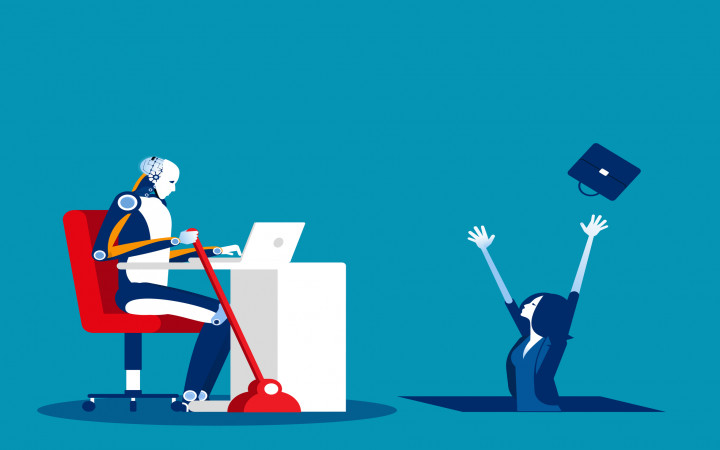Today’s Wonder of the Day was inspired by WonderTeam. WonderTeam Wonders, “Will AI take our jobs?” Thanks for WONDERing with us, WonderTeam!
What do you dream of doing for work when you’re older? Will you study sea life as a marine biologist? Maybe you’ll open your own business. Some kids might even grow up to eat ice cream for a living! Or perhaps you’ll have a job that doesn’t even exist yet.
Yes, that is possible! New types of work pop up all the time. In the past, new jobs have grown during times of major change. Often, this comes about because of new technology. One example is the Industrial Revolution. Today, one technology that could change work is artificial intelligence (AI).
What is AI? When they hear “artificial intelligence,” some people picture robots taking over the world. However, that’s not what this technology looks like today. The first person to talk about AI was the mathematician Alan Turing. He described it as a technology that would be able to think and reason like a person.
AI includes any machine that reacts to information the same way a person would. AI technology can use judgment to make decisions. It can look at many parts of a problem. Perhaps most noteworthy, it can learn. That means AI technology can change its actions based on feedback from its surroundings.
Do you use any AI technology? One example of AI that’s already common today is smart speakers. In fact, many smart home devices use AI technology. But many people are more interested in learning how AI might affect life outside of the home.
How will AI impact jobs and the workplace? That’s a question experts are still trying to answer. Some of their predictions sound scary to many people. For example, some people believe AI technology could automate all human jobs in the next 120 years.
What will the automation of jobs mean for people? For many, it will mean moving into other types of work. For others, it could mean difficulty in finding a job. A few industries most at-risk of job shortages are manufacturing, clerical work, service, and transportation.
Not all experts agree that this will be the case, though. In fact, some believe that AI will have the opposite effect. They say it will make more jobs than it replaces. To support this, they point to technology’s long history of job creation.
After all, something similar happened in just the past few decades. What are we talking about? The Internet, of course! Many of today’s jobs didn’t exist before the Internet. Think of all the people who work at Google, Amazon, and Facebook. None of those companies would be possible without the Internet. And, now that we think of it, neither would Wonderopolis! As you can see, people are often unable to predict the new jobs technology may lead to.
What’s your best bet for success in a future that involves AI automation? As is true with most jobs today, it’s important to always keep learning. Lifelong learners are often the most likely to stay ahead of advances in technology.
Will artificial intelligence have the same effect as the Internet? What new companies and careers might emerge due to this technology? Or do you see a future in which humans no longer have jobs? Either way, creative minds will be needed in the automated world. One of them could be you!
Standards: NGSS.ETS1.A, CCRA.L.3, CCRA.L.6, CCRA.R.1, CCRA.R.2, CCRA.R.4, CCRA.R.10, CCRA.SL.1, CCRA.W.2, CCRA.W.4, CCRA.W.7,




